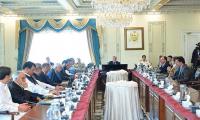LAHORE: United Kingdom’s first-ever baby with three parents could grace the planet in 2017 as scientists have declared the controversial IVF technique, a fertility procedure, safe for use in women.
The fertility technique is being pioneered by Britain’s famous Newcastle University.
Through the “IVF technique,” which involves using a second woman’s egg, a healthy child could be born to couple whose children have been blighted by horrific genetic diseases.
In its fairly recent June 8, 2016 edition, the “Mail Online” has stated: “Such a child would effectively have three parents – the couple, plus the woman that donated the egg.
A study has shown a controversial IVF technique safe for use in women, which could lead to Britain's first three-parent baby within a year.
The fertility technique (illustrated) is being pioneered Newcastle University and could enable couples carrying horrific genetic diseases to have a healthy baby using a donor egg.”
The prestigious British newspaper has added: “Now, following more than a decade of experiments on eggs and embryos in the lab, the scientists say they are ready to treat the first women.
However, concerns remain about the safety – and the researchers admit that they can’t guarantee that every baby will be healthy.
The controversy surrounds work aimed at eliminating incurable diseases caused by faulty mitochondria - the tiny sausage-shaped powerhouses inside cells that turn food into energy.”
The “Mail Online” has gone on to write: “These defects cause serious illness in one in 6,500 babies and are responsible for 50 genetic diseases, many of which kill in infancy.
Women carrying damaged mitochondria can also miscarry repeatedly and often face the heartbreaking choice of whether it would be best to remain childless.
To help them, the scientists have developed a technique in which the mother-to-be's diseased mitochondria are swapped with healthy ones from an egg donated by another woman.”
The newspaper has further observed: “Successful 'mitochondrial replacement' would allow the couple a healthy child that is genetically their own. Supporters say it will give couples who have endured the heartache of repeatedly miscarrying or burying much longed-for children the option of having a healthy family.
But critics argue that genetically engineering eggs and embryos crosses a crucial ethical line – and claim the first women and babies will be guinea pigs in a dangerous experiment.
British law was changed last year, to allow the technique to be used. And now, the Newcastle researchers say they have completed the work needed to show the technique is safe enough to be offered to women.”
Justice Tariq Mehmood Jahangiri took up Sher Afzal bail plea for hearing
CCP’s announcement made, stating that applicants are required to pay money upfront in order to enroll
According to details, the police took a van filled with female students of medical college to a police station on...
In this image, the logo of the Nowshera Press Club can be seen. — Facebook/Nowshera Press Club/FileNOWSHERA: The...
Senator Sherry Rehman said the PPP had previously extended an offer to the PTI to form a government, but the PTI is...
A division bench comprising Justice Shakeel Ahmad and Justice Dr Khurshid Iqbal heard the petition filed by the KP...







